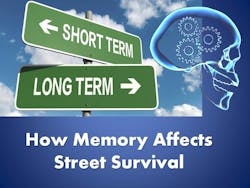Your memory plays a very important role in your life as a cop. There are thousands of things a police officer needs to remember on a daily basis. Laws, both state and local, as well as department policies, can by themselves can be overwhelming. While those are indeed important, the rules that govern our survival on the street trump all others.
How does memory fit in to survival? Read on. By way of explanation, there is a distinction between short-term memory (also known as primary or active memory) and long-term memory. The simplest explanation of short–term memory is any information we acquire which is not rehearsed or actively maintained; it lasts mere seconds. Short-term memory is also limited—it can only hold about seven items for about 20 or 30 seconds.
If you were to ask someone about their understanding of what long-memory is, they’d likely shrug and tell you it’s simply memory, or better yet, remembering things. However, before information can become long-term memory, most experts in the field believe information must first pass through sensory and short-term memory.
To illustrate what short-term memory is, think about the difficulty in remembering a phone number. After hearing it, you try to make a mental note, but seconds later when you try to dial the number, you’ve already forgotten it. Unless you’ve repeated the number and committed it to memory, the information is gone.
Now, let’s compare short-term memory to long-term memory. Since short-term memory is limited in both capacity and duration, for retention purposes we must somehow transfer the info to long-term memory. How do we do that? By rehearsal. A good analogy of this procedure is studying for an exam, perhaps a promotional exam. You review the relevant information repeatedly until the facts are committed to memory. Unlike short-term memory, which is limited and disappears rapidly, long-term memory can store unlimited amounts of information indefinitely.
What does all of this mean to you? Simply this - rehearsal, i.e., training, is the pathway to remembering the skills you may need to survive. For instance, range time assists us in permanently marking our mind with regard to firearm skills. Drawing from the holster and getting quickly on target each time is a skill that needs to be filed in our long-term memory. Wearing your weapon in the same spot, along with spare mags, taser, cuffs, etc., and practicing deploying them the same way each time, saves valuable time. When your training is consistent, your reaction time is reduced. As police officers, we know the quickest reaction time to very obvious stimuli is ¼ - ½ second. We certainly don’t want to add to that time.
There’s an interesting process known as Myelinization. It causes the brain to quickly process sensory data, via synapses, by building direct pathways between neurons. This process enables us to act quickly and efficiently as the brain sends signals to the muscles to perform a particular motor skill. This Myelinization occurs through repetition in training. Again, firearms, DT, traffic stops, arrest plans, etc., all need constant review and rehearsal in order to fortify our long-term memory. This automatic response to stimuli gives us the ability to act without having to think about it first.
One last thing … how does sleep affect memory? Recent studies have shown that adequate sleep enhances memory for things such as word associations and virtual navigation tasks. The old adage, “sleep on it”, is good advice since the benefits of sleep on declarative memory performance (test taking) have been shown to improve with a good night’s rest. Conversely, sleep deprivation adversely affects hippocampal activation, resulting in poor memory retention. The conclusion - sleep is essential for committing important information to long-term memory.
Stay Safe, Brothers & Sisters!
Links:
About the Author
John Wills
John M. Wills is a former Chicago police officer and retired FBI agent. He is a freelance writer and award-winning author in a variety of genres, including novels, short stories and poetry. John also writes book reviews for the New York Journal of Books, and is a member of the National Book Critics Circle. His new book, The Year Without Christmas, is available now. Visit John at: www.johnmwills.com.

